14+ SAMPLE Company Incorporation Certificate
-
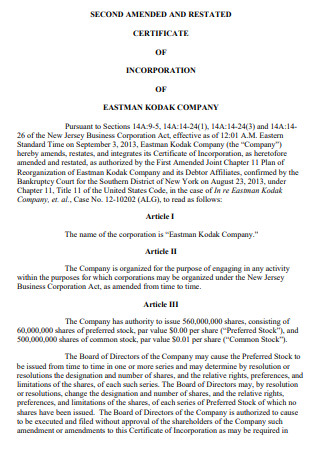
Company Incorporation Certificate
download now -
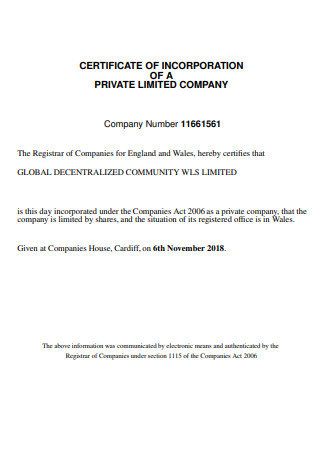
Private Company Incorporation Certificate
download now -

Corporation Company Incorporation Certificate
download now -
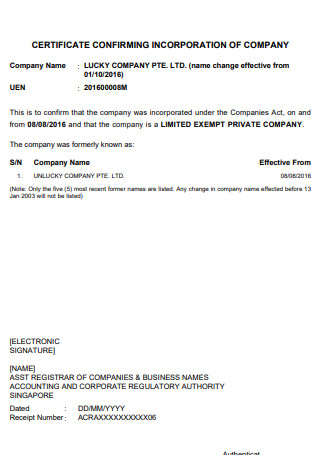
Certificate Confirming Incorporation of Company
download now -
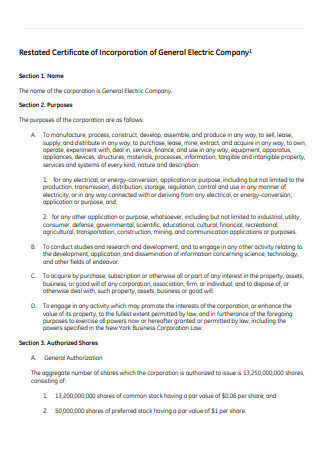
Certificate of Incorporation of Electrical Company
download now -
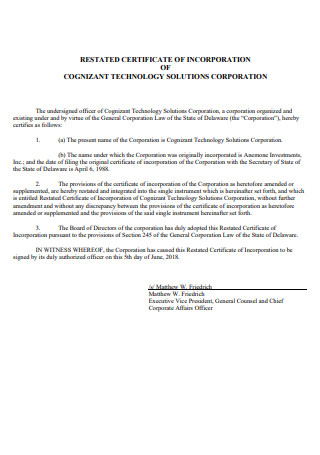
Restated Certificate of Incorporation
download now -

Fifth Restated Certificate of Incorporation
download now -
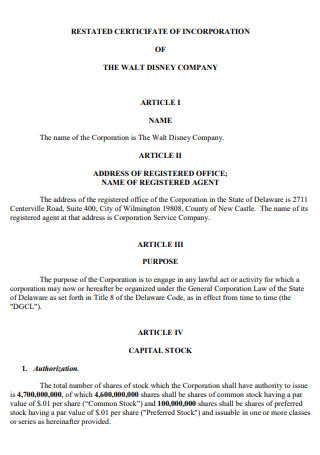
Disney Company Incorporation Certificate
download now -

Company Conformed Copy Amended Certificate of Incorporation
download now -
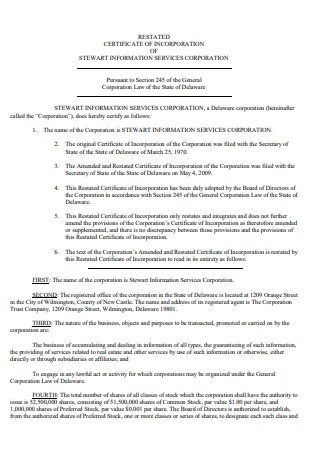
Trust Restated Company Incorporation Certificate
download now -
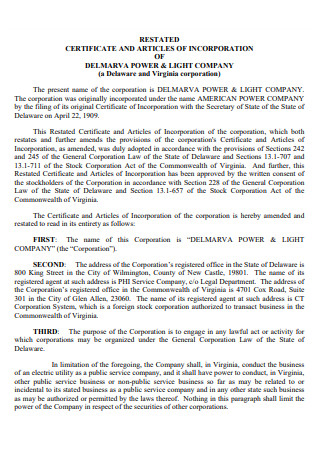
Certificate of Article Incorporation Company
download now -

Attestation of Certificate Incorporation Company
download now -
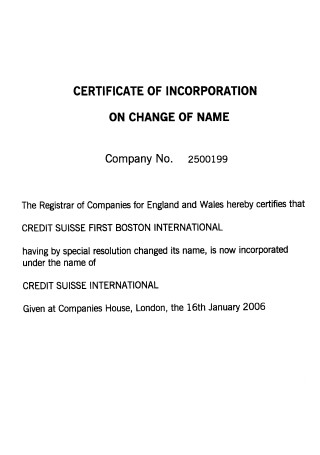
Change of Company Name Incorporation Certificate
download now -

Sample Company Incorporation Certificate
download now -
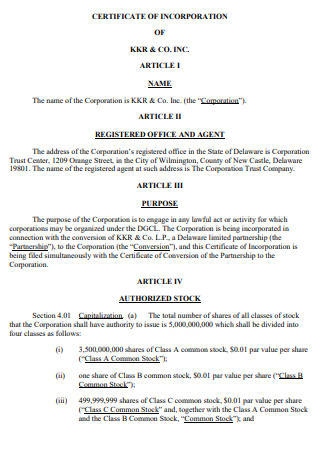
Corporation Company Incorporation Certificate in PDF
download now
FREE Company Incorporation Certificate s to Download
14+ SAMPLE Company Incorporation Certificate
What Is a Company Incorporation Certificate?
Benefits of Incorporating Your Business
Types of Company Certificates
How to Incorporate a Business
FAQs
Why is an incorporation certificate needed?
Do all companies have a certificate of incorporation?
Why is it important to incorporate a company?
What Is a Company Incorporation Certificate?
A company incorporation certificate is a document that confirms the formation of a corporation or company. This indicates that you have registered your brand. It is granted to entrepreneurs who desire to incorporate a business. It is a crucial prerequisite for registering for taxes, creating a recruitment plan, and opening a company account. The 2020 List of Establishments of the Philippine Statistics Authority (PSA) indicates that there are a total of 957,620 businesses operating in the country.
Benefits of Incorporating Your Business
The choice to incorporate a small firm is monumental. Perhaps you just opened your doors, and business is booming. Also, maybe your small business hasn’t yet gotten off the ground. Incorporating is a wise choice for the vast majority of firms and not only those well-established. You should know several benefits to your business before deciding what is best for your firm. Before incorporating your business, you should consider the following ten advantages.
Types of Company Certificates
You should examine the six credentials listed below to advance your business career. These certificates are the most widely recognized corporate world, allowing you to improve your career in more places. In addition, they cover a vast array of topics, including leadership, business analysis, sales, and marketing. You can include any of these certifications on your resume, making you stand out regardless of where you seek employment.
1. Certified Business Analysis Professional
The International Institute of Business Analysis provides the CBAP certification. This course is designed for individuals interested in studying businesses and devising solutions to meet their needs. To enroll in this certification program, you must have at least several years of business analysis expertise. To obtain this qualification, individuals must pass an examination. One hundred twenty-five multiple-choice questions must be answered in less than three and a half hours. Exam topics include strategy evaluation, solution assessment, life cycle management, and business analysis planning.
2. Project Management Professional
Advancing your corporate career requires you to assume more significant leadership duties. You must be capable of managing both people and projects. Project Management Professional (PMP) is an industry-recognized qualification for project managers. It can enhance your employment and earning opportunities. To obtain this certificate, you must pass an exam consisting of 200 multiple-choice questions without utilizing any references. Exam subjects include project planning, project implementation, and project monitoring.
3. Professional Certificate in Team Leadership
The Professional Certificate in Team Leadership is another leadership qualification that focuses on enhancing your capacity to lead others. This internationally recognized credential will enable you to exhibit your leadership skills. You can utilize it in your present leadership position or further your career. It is advised that you complete the training program first. You can study from the comfort of your home via e-learning or at one of the Chartered Institute for IT’s training providers worldwide.
4. Salesforce
Salesforce is currently one of the most widely used customer relationship management (CRM) platforms. Because they rely on this CRM, many companies now require Salesforce skills in job postings. Salesforce provides a variety of certifications, some in IT and software development and others for sales and marketing. The accreditation you should obtain will primarily rely on your job objectives.
5. HubSpot Inbound Marketing
For many organizations, inbound marketing plays a significant role in sales. Instead of actively pursuing customers, inbound marketing focuses on attracting them to you. If you can demonstrate your mastery of inbound marketing strategies, you will be a more desirable applicant and employee. HubSpot’s inbound marketing certification is an excellent tool for achieving this objective. This certification can be obtained for free and entirely online. You will learn the fundamentals of inbound marketing and how they can be applied to a business.
6. APICS Certified Supply Chain Professional certification
The CSCP certification validates your ability to streamline processes. It is more concerned with a firm’s supply side than sales or marketing. This certificate will teach you how to manage global end-to-end supply chains and maximize your organization’s ERP investments.
How to Incorporate a Business
Various processes involve incorporating a firm, from picking a name to selecting an entity. If you consider merging your firm, you are only establishing a legal entity apart from yourself. A corporation can possess property, execute contracts, be sold, and continue operations without your involvement, and you are not personally accountable if it declares bankruptcy. While each state handles the procedure slightly differently, there are six fundamental steps to remember.
Step 1: Choose a business name
Selecting a name is one of the most exciting parts of establishing a business. The primary legal criterion is that you cannot use a previously taken name. Your state will provide a corporate search service to determine the availability of any desired name. In this age of search engine technology, you should also examine whether a suitable domain name is accessible for the chosen name. Check availability with a site hosting service. Consider whether you want to use a trademark or logo to distinguish your business. It would help if you searched with the United States Patent and Trademark Office to guarantee that your proposed brand is distinctive.
Step 2: Pick a location
While you do not need to rent office space immediately, your firm does require a suitable location. Because many state and local governments restrict where a business can be located, it must also comply with applicable codes and regulations. There are numerous low-cost solutions for business addresses. Companies offer virtual offices and shared workspaces. You may sublease office space, or you could even start your business out of a rented Post Office box. A commercial office may be a top consideration if you create a larger company with multiple employees.
Step 3: Decide on a corporate entity
Next, filing articles of incorporation is required. Depending on state laws, these forms will include a description of the shareholder structure and an initial listing of directors. Typically, a first shareholder meeting is conducted to discuss formalities, such as shares and bylaws. While LLCs are not required to adopt bylaws, most companies do. Bylaws will handle meeting times, voting rights, corporate officers, contract approval, and sign checks.
Step 4: Obtain a tax identification number and Manage the funds
Similar to how it monitors individuals with a Social Security Number, the IRS monitors businesses with an Employer Identification Number (EIN). Online EIN applications are accepted via the IRS website. Even if a corporation has no extra employees, it is still essential to obtain an EIN. In addition, once your firm has an official name and EIN, you must open a corporate bank account for business expenses. A corporate bank account demonstrates the legal distinction between the owner and the firm by establishing its legitimacy and independence. It also gives the company shield, its associated liability protection, and tax and accounting simplicity. After establishing corporate banking, you and your accountant will consider the proper taxation approach for your organization. As described in Step 3, most LLCs and S corporations qualify for pass-through taxation, but C corporations are often subject to double tax.
Step 5: State completion and permit and license acquisition
Legal rules rely on several variables, including the sort of business at issue and its region. For instance, larger organizations are required to file with the state following their initial board meeting. If stock is being sold, federal securities requirements must be observed. On the website of your country’s Department of Corporations or small business division, you can find specific details regarding these requirements.
FAQs
Why is an incorporation certificate needed?
Certification of incorporation renders your company legally enforceable in the eyes of regulatory agencies. Several legal conditions must be satisfied for a business to be incorporated by the governing law. The development of an MOA and AOA is essential for achieving this objective.
Do all companies have a certificate of incorporation?
It certifies and confirms a company’s legal existence and trading authorization. A certificate of incorporation is supplied to all firms registered at Companies House. The following company information will be included on the certificate of incorporation: Company’s official name.
Why is it important to incorporate a company?
Your assets may be seized as a sole proprietor to pay off business debt. If you incorporate your business, your assets will be better secured against any legal difficulties it may face.
They claim that every business begins with one. And when people observe your accomplishments, they will desire to experience the same success. The certificate of incorporation is not only a mandatory business necessity but also a sign that you’ve come a long way from your commencements. Peruse our collection of high-quality incorporation certificate templates and obtain one now.
